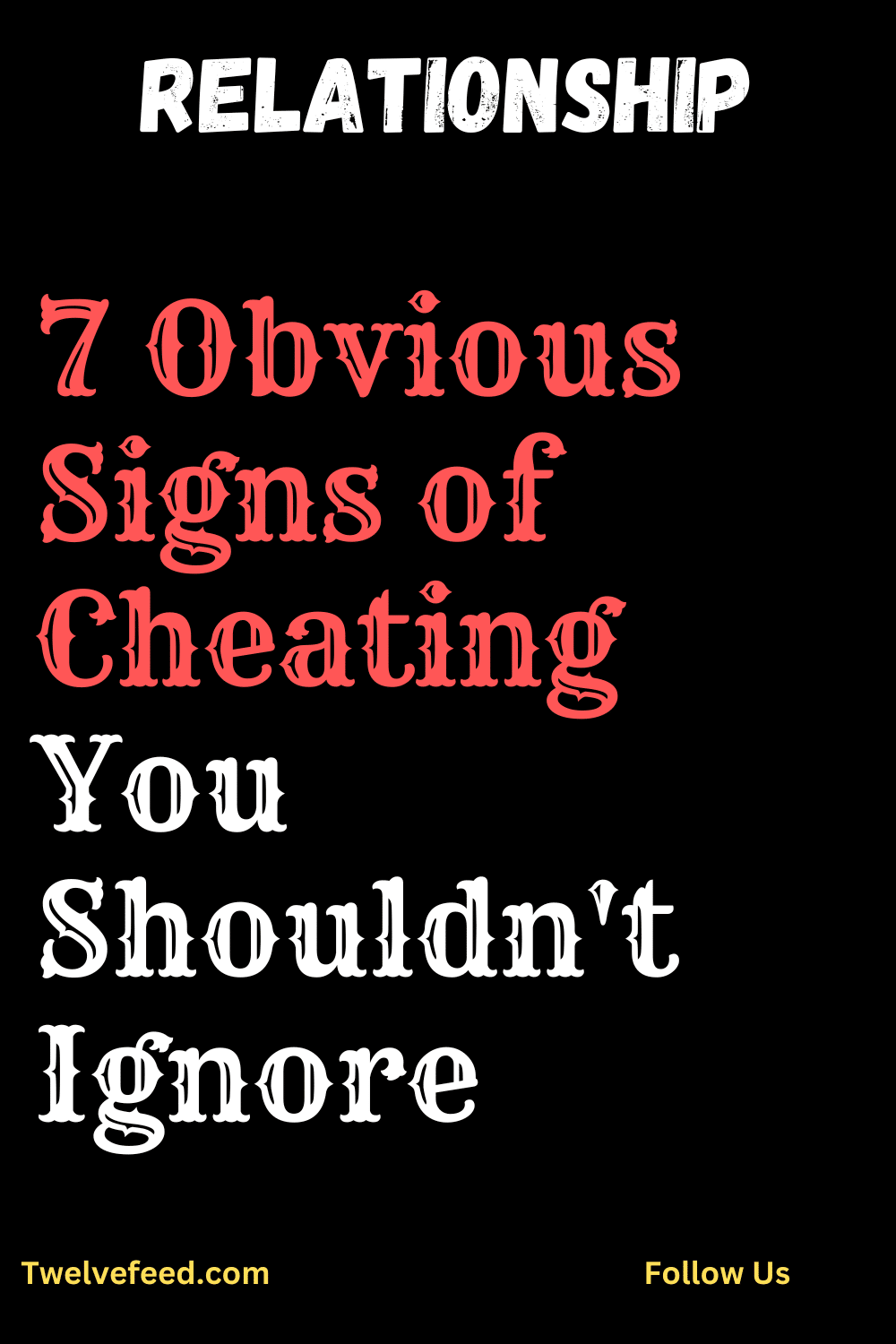
Cheating in a relationship is a deeply hurtful betrayal that can cause immense emotional pain and damage trust. Unfortunately, infidelity is not uncommon in today’s world. It is important to be aware of the signs that may indicate your partner is cheating on you. While every situation is unique, some common red flags should not be ignored. In this article, we will explore seven obvious signs of cheating that you should pay attention to.
1. Introduction
Cheating can take many forms, ranging from emotional infidelity to physical affairs. Regardless of the type, it can have devastating effects on a relationship. Recognizing the signs of cheating is crucial for protecting yourself and making informed decisions about your future. Let’s delve into the seven obvious signs that you should be aware of.
2. Change in Behavior and Habits
One of the most noticeable signs of cheating is a sudden change in behavior and habits. Your partner may become distant, secretive, or exhibit unexplained mood swings. They may start spending more time away from home or engage in new activities without you. Pay attention to any significant shifts in their behavior as it could be a sign that something is amiss.
3. Increased Secrecy
A sudden increase in secrecy is another red flag to watch out for. If your partner starts guarding their phone, password-protecting their devices, or insisting on privacy when it was not a concern before, it might indicate they are hiding something. Be cautious if they become overly protective of their personal space and exhibit a lack of transparency.
4. Lack of Emotional Intimacy
Emotional intimacy is a vital aspect of any relationship. When someone is cheating, they may withdraw emotionally from their partner. They might become less interested in sharing their thoughts, feelings, or experiences with you. If you notice a significant decline in emotional connection and open communication, it could be an indication of infidelity.
5. Decreased Interest in Physical Intimacy
While a decline in physical intimacy can occur due to various reasons, it can also be a sign of cheating. If your partner shows a sudden lack of interest in being intimate with you or their behavior in the bedroom changes significantly, it is worth exploring the possibility of infidelity. However, it is essential to have open and honest conversations to understand the underlying reasons before jumping to conclusions.
6. Suspicious Phone and Internet Activity
In today’s digital age, smartphones and the internet play a significant role in our lives. If your partner becomes excessively protective of their phone, regularly deletes messages or browser history, or is secretive about their online activities, it might be cause for concern. Pay attention to any unusual behavior involving their devices as it could indicate they are trying to hide something.
7. Guilt and Defensiveness
When someone is cheating, they often experience guilt and fear of being discovered. As a result, they may become defensive and overly protective of their actions. If your partner becomes irritable, defensive, or accuses you of being suspicious without any valid reasons, it could be a sign that they are hiding something from you.
8. Unexplained Absences and Excuses
Frequent unexplained absences and a string of excuses can be significant indicators of cheating. If your partner frequently disappears without a reasonable explanation or if their excuses seem inconsistent or unreliable, it is essential to take note of these behaviors. While occasional unpredictability is normal, a pattern of unexplained absences may suggest they are engaged in an affair.
9. Conclusion
Cheating is a painful reality that many individuals face in their relationships. It is essential to trust your instincts and be aware of the signs that might indicate infidelity. However, it is crucial to approach the situation with open communication, empathy, and a willingness to understand the underlying reasons behind any suspicious behavior. If you suspect your partner might be cheating, seeking professional guidance from a therapist or counselor can provide valuable support during this challenging time.
10. FAQs
Q1: How do I confront my partner about suspected infidelity?
A1: Confronting your partner about suspected infidelity can be a difficult conversation. Choose a calm and private setting, express your concerns using “I” statements, and be prepared to listen to their perspective. It is crucial to approach the conversation with empathy and avoid becoming accusatory or hostile.
Q2: Are these signs definitive proof of cheating?
A2: The signs mentioned in this article are not definitive proof of cheating. They serve as potential indicators that something might be wrong in the relationship. It is important to have open and honest conversations with your partner to gather more information and make informed decisions.
Q3: Can a relationship survive infidelity?
A3: While infidelity can severely damage a relationship, a relationship can survive and heal with a dedicated effort from both partners. Rebuilding trust, seeking professional help, and open communication are crucial in the recovery process.
Q4: Should I hire a private investigator to catch a cheating partner?
A4: Hiring a private investigator is a personal decision that depends on your circumstances. It can provide concrete evidence of infidelity, but it is important to consider the potential impact on your emotional well-being and the relationship itself.
Q5: How can I rebuild trust after infidelity?
A5: Rebuilding trust takes time, patience, and consistent effort from both partners. It requires open and honest communication, transparency, and a willingness to address the underlying issues that contributed to the infidelity. Seeking professional guidance can be beneficial in the healing process.
In conclusion, being aware of the signs of cheating is crucial for maintaining a healthy and honest relationship. By paying attention to changes in behavior, increased secrecy, lack of emotional and physical intimacy, suspicious phone and internet activity, guilt and defensiveness, and unexplained absences, you can make informed decisions about your relationship. Remember to approach any suspicions with open communication, empathy, and a willingness to seek professional help if needed.





